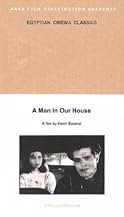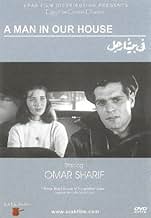Fi Baytena Ragul
- 1961
- 2h 39min
NOTE IMDb
7,5/10
1,1 k
MA NOTE
Ajouter une intrigue dans votre langueBased in British occupied Egypt, Ibrahim (Omar Sharif), a member of the resistance, seeks refuge in the house of a politically passive family after killing the prime minister for his acts of... Tout lireBased in British occupied Egypt, Ibrahim (Omar Sharif), a member of the resistance, seeks refuge in the house of a politically passive family after killing the prime minister for his acts of treason.Based in British occupied Egypt, Ibrahim (Omar Sharif), a member of the resistance, seeks refuge in the house of a politically passive family after killing the prime minister for his acts of treason.
- Récompenses
- 1 nomination au total
Histoire
Le saviez-vous
- AnecdotesThe movie is based on a novel by the same name written by Ihsan Abdel Quddous.
- GaffesAt the beginning of the movie, it is shown that there's one rebel jumping onto the river over the bridge. However, it is shown that this stunt is an experienced swimmer, not a normal person.
- ConnexionsReferenced in La vie devant soi (2020)
Commentaire à la une
A Man in Our House is a 1961 Egyptian film about the resistance to British rule in Egpyt which ended in the exile of the puppet King Farouk in 1954 and the rise to power of Gamal Abdel Nasser. A classic of the once prolific Egyptian cinema, the film begins with the assassination of the King's prime minister by a revolutionary youth Ahmed Hamdi (the young Omar Sharif). Fleeing the police, Hamdi hides with an apolitical, middle-class Egyptian family who risk much in hiding the fugitive. The plot is markedly similar to Fritz Lang's earlier 'Hangmen Also Die', a film about the assassination of the Reichsfuehrer of Czechoslovakia during the Second World War.
As a political drama the film, made during Nasser's reign, is not very subtle. Nonetheless, the portrait of ordinary Egyptians attempting to rise to their forced participation in the revolution is both touching and effective. The struggle of the initially reluctant father is particularly well handled: his politics are throughout ambiguous and his first loyalty is to his family. Nonetheless he is driven by both paternal feelings and a sense of cultural and religious duty to the unbidden guest, who is only a loose acquaintance of his son.
There is an inevitable romance between Sharif and one of the daughters, which is inoffensive if conventional. The interesting love story involves the elder daughter and a vulgar and corrupt cousin. More culturally specific are the themes of police manipulation and brutality, and the presence of Islam in everyday life. The chief of police is presented as intelligent, brutal and a little sadistic in his methods. And, like Nasser, Sharif is a mainly secular political agent, who does not own a Koran until he is given one by the mother. Her religious sentiment is treated sympathetically, and the dialogue is infused with religious invocations. But Islam is in the background and the focus of the movie is on the more contemporary values of nationalism and romantic love.
Available in a recent series of Egyptian DVD, the film looks very good and is beautifully shot. Unfortunately, the pace is far too slow and its 159 minutes seem about 40 too many. Most of the acting is impressive, and one gets something of a sense of middle-class Egyptian mores of the period. But the film also has a strong flavour of Hollywood, in its resemblance to Lang's film and, more generally, in its attempt at representing a 'model' family. This combination of the familiar and the alien, and its overall high quality makes the film well worth seeing.
As a political drama the film, made during Nasser's reign, is not very subtle. Nonetheless, the portrait of ordinary Egyptians attempting to rise to their forced participation in the revolution is both touching and effective. The struggle of the initially reluctant father is particularly well handled: his politics are throughout ambiguous and his first loyalty is to his family. Nonetheless he is driven by both paternal feelings and a sense of cultural and religious duty to the unbidden guest, who is only a loose acquaintance of his son.
There is an inevitable romance between Sharif and one of the daughters, which is inoffensive if conventional. The interesting love story involves the elder daughter and a vulgar and corrupt cousin. More culturally specific are the themes of police manipulation and brutality, and the presence of Islam in everyday life. The chief of police is presented as intelligent, brutal and a little sadistic in his methods. And, like Nasser, Sharif is a mainly secular political agent, who does not own a Koran until he is given one by the mother. Her religious sentiment is treated sympathetically, and the dialogue is infused with religious invocations. But Islam is in the background and the focus of the movie is on the more contemporary values of nationalism and romantic love.
Available in a recent series of Egyptian DVD, the film looks very good and is beautifully shot. Unfortunately, the pace is far too slow and its 159 minutes seem about 40 too many. Most of the acting is impressive, and one gets something of a sense of middle-class Egyptian mores of the period. But the film also has a strong flavour of Hollywood, in its resemblance to Lang's film and, more generally, in its attempt at representing a 'model' family. This combination of the familiar and the alien, and its overall high quality makes the film well worth seeing.
Meilleurs choix
Connectez-vous pour évaluer et suivre la liste de favoris afin de recevoir des recommandations personnalisées
Détails
- Date de sortie
- Pays d’origine
- Langue
- Aussi connu sous le nom de
- A Man in Our House
- Voir plus de crédits d'entreprise sur IMDbPro
- Durée2 heures 39 minutes
- Couleur
Contribuer à cette page
Suggérer une modification ou ajouter du contenu manquant

Lacune principale
By what name was Fi Baytena Ragul (1961) officially released in Canada in English?
Répondre

























